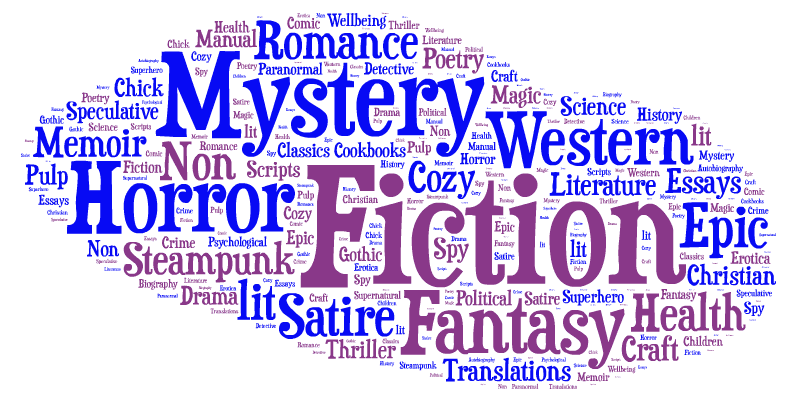Fiction is a form of writing based on fantasies and imagination. Nonfiction, on the other hand, covers real events, stories, facts, and people. But the actual definitions of these words are far more detailed than this.
The genre you choose at the end of this blog depends on the type of writer you are and the idea you’re about to shape into a book.
So if you’re someone who can be exceptional with made-up characters, plots, and stories, fiction is your deal. But if you’re more inclined toward real-life events, your skills are more appropriate for writing about incidents, people, places, and situations that exist.
Is fiction real or fake? What does nonfiction mean? What is a fiction book, and how do I write one? Will I excel at fiction, or will non-fiction be more my speed? If you find yourself pondering these questions, don’t feel overwhelmed.
To help you with a better understanding of the difference between fiction and nonfiction, we will talk about the following in this blog:
- The key difference between fiction and nonfiction writing forms
- In-depth understanding of fiction writing
- Genres, characteristics, and facts related to fiction writing
- All about non-fiction writing facts and techniques
- How to pick the right genre
This blog will cover both topics in detail to help you make an informed decision. Without further ado, let’s dive in.
What is Fiction and Non-fiction?
If you’re an avid reader or have dabbled in writing before, this is probably not for you. But there are a lot of first-time authors who have a difficult time understanding the difference between the two genres. This is why we have come across many asking the question: Is fiction real?
Let’s start off by tackling the question head-on. For those who want to know, no, fiction is not real. In fact, fiction is purely based on the author’s imagination. It is an entirely imaginative form of literature with unreal characters, places, events, and descriptions. A fiction writer can take a book forward in whatever direction they like depending on their thought process. Nothing exists in reality.
The thoughts occurring in the head of the writer decide how the story flows. When writing fiction, there’s no right and wrong—except if something doesn’t work for the story.
When a reader picks up a fiction book, they know that the story came from the thoughts engulfing the author’s creative mind and has nothing to do with reality. This form of literature is often translated into movies, comic books, novellas, TV shows, and fairy tales.
As far as non-fiction books are concerned, this is another creative writing genre that includes content based on facts.
Even if it is a story, it will be based on a real-life event and will not be made up. The common book types that fall into the category are often related to journalism, politics, history writing, education, memoir, biographies, travel logs, etc.
Additional non-fictional work can be divided into textbooks, cover letters, newspaper reports, and more.
The Difference Between Fiction and Nonfiction
Subjective vs. Objective
Fiction books are subjective as they entirely depend on their author’s imagination. This type of writing starts with a brilliant plot, where you can create relatable and strong characters and add twists per your imagination.
You can give it any shape or any direction you find appropriate. This form of literature is heavily based on themes of excitement and fantasy. Therefore, the entire story arc is subjective and depends on how creative you are.
Nonfiction books are objective, where the idea is based on real people and situations and doesn’t include any sort of modification or factual augmentation.
Imagination vs. Facts
As a fiction writer, an author is expected to input all his brain power to set up a plot that keeps the readers engaged until the end. It takes great storytelling skills and vivid imagination to put that amazing story in your head in the right words.
Regardless of the type of nonfiction you’re writing, the content will still be all about real-life events, facts, and figures. And while you may include your own opinions to elaborate on the subject, you cannot alter any fact you’re stating in the book.
Entertainment vs. Information
Think of an entertaining fiction book, and names like The Hunger Games, Harry Potter, and Charlie and the Chocolate Factory will pop up in your head. Do you know that’s the common factor that makes these books such a hit? The fact that they’re all fiction and written for entertainment.
Even though a fiction book enables you to create a whole imaginative world in your own head and think of unbelievable scenarios, it is mainly to entertain you.
Non-fiction can be entertaining, too, especially if you’re writing an interesting book and including stories about a particular subject coming from different people and their real experiences. However, most of this literature’s work will include credible and worthy information that’s straightforward and fact-driven.
It is often written with the goal of providing the reader with information or knowledge regarding a variety of worldly events.
Credibility vs. Non-credibility
Non-fiction writers, unlike fiction writers, are responsible for their work. If it falls in the nonfiction genre, it is the author’s responsibility to ensure that everything in the book is factually correct. Since fiction is all about imaginary and surreal scenarios, fiction writers do not have to provide any credibility for their work. Even if a fiction book is based on a serial killer, it has nothing to do with reality and may include any plot the author has decided.
What is Fiction—Going a Step Further
Now that you know “what fiction means,” this part of the blog gives you deeper insights into what this form of literature is all about. Keep reading!

Fiction Meaning and Its Different Forms of Writing
What is a fiction book? Does fiction refer to just one type of writing?
No! Fiction can take various forms, including:
Novels: If you’re a reader, you may have several novels that you love reading repeatedly. Novels consist of a single long story. It requires real expertise to write novels and keep the reader hooked for hundreds of pages without losing interest.
Novellas: This standalone piece of fiction enjoys great hype because of its perfect length. It’s not as long as a novel but not too short, either.
Flash fiction: Followed by a strict word count to express a story, this can be challenging for newbies to try out. You have very little flexibility to convey an enticing story.
Short stories: Most people prefer reading short stories that they can finish quicker and return to their business. It’s a great way to read every day without committing yourself to read a long novel.
Poems: Poems can be short or as long as the author wants. It is a chosen language with imagery, rhyme, and rhythm to narrate a catchy story.
Fiction doesn’t have to be a book. It can be any form of content. Your favorite film can be a work of fiction. Any narrative poem falls into the same category.
Popular Fiction Genres
Generally, the mainstream fiction you find everywhere will fall into popular fiction genres. It is a category or style of a book. If you’re a writer, you would know how crucial it is to identify the different genres. It gives you writing control and helps you create the right approach.
To understand the real fiction book meaning, you need to understand their genres. Here are the top ones:
Crime fiction: Another popular genre that people love. If you like to keep yourself on your toes and resolve a book that’s based on mystery, you need to check out crime fiction. Usually, the flow of the book will include steps such as introducing the characters, the occurrence of the crime, the investigation, and the revelation of the culprit. Suspenseful yet entertaining!
Fantasy fiction: The two sources that drive fantasy fiction are legend tales and myth. There’s no boundary to how far a fantasy can go, so you can expect anything under this genre. You will find historical fantasy fiction books that feature mythical and supernatural characters.
Thriller fiction: If you have an adventurous mind with an imaginative target audience, thrillers can save the day. These include suspenseful plots, high stakes, and dark storylines that will keep you hooked.
Sci-fi: Short for science fiction, is an acclaimed form of fiction writing that enables us to take our imaginary world into the future. These books revolve around topics such as aliens, robots, machines, astronauts, technology, science, and more.
Young-adult fiction: We can’t think of a better example of this genre than the famous Harry Potter. Often the characters are so strong in these fiction books that the target audience can relate to them. The stories involve coming-of-age journeys through the lens of the author.
Romance or romantic comedy fiction: Let’s be real: the romantic fiction genre is indeed the best-selling in the fiction category. These stories involve characters with the strong element of love and romance.
The story you’re planning to write may fall into more than one of these fiction genres. Categorizing it will help you take the right approach from scratch.
Main Characteristics of Fiction Writing
The most important characteristics of your book will depend on what’s relevant to your story. However, there are three primary characteristics that every author of fiction writing should consider:
Building the character
Since these books or form of literature is based on imagination, it is important to create the book’s main character—whether normal, mythical, or fancy. It doesn’t even have to be a human. Your character can be an animal or an inanimate object. The description of the character is the most crucial part. Take several pages or hundreds of words if you have to, but make sure the main character is expressed in the best way for your audience to connect with them.
Establishing the plot
That’s the whole idea behind the story. It consists of the main event and situations that will drive the flow through the book. Coming up with a catchy plot can make or break your game.
Point of view
Even though the dialogue in fiction is unreal, there has to be dialogue and the right one. The way you narrate the story is very important. It is how you introduce the book, its characters, the setting, and everything that goes beyond that in the most effective manner.
What Is Non-Fiction—Taking a Deeper Dive
Like fiction, nonfiction is also a wide genre that covers all books not rooted in fictional literature.
Nonfiction, even though based on reality, doesn’t have to be boring. It can be the world-class biography of a famous celebrity with entertaining and humorous commentary or a technology book with facts and figures.
The only thing you need to remember when trying to recall the nonfiction definition is that if a book is not a made-up story and doesn’t come from the author’s imagination, it’s nonfiction.

Non-Fiction Meaning and Its Essential Genres
To create clear lines between fiction and nonfiction, check out the top genres under this category.
Biographies and memoirs
Although there are subclassifications within this type, these book genres are usually grouped together because they run on the same theme: they tell life stories. While biographies are written about popular people in a third-person narrative, memoirs and autobiographies are authored by the subjects themselves. These books include real stories, inspirational journeys, struggles and achievements, and much more related to the subject’s life.
History
Books that cover historical events and eras also fall into the nonfiction genre. Some of these books will entirely dwell on objective facts, while some authors may give it a personalized favor by also involving their personal beliefs and point of view. Regardless, the book will only present facts, figures, and true stories to qualify as nonfiction.
Travelogues
These are pretty much the same as memoirs, except they’re based on the author’s specific traveling experience. These instructive writing pieces offer practical information and advice regarding traveling to certain destinations.
Self-help books
These books have gained a lot of popularity in the world of nonfiction writing. They can be written about any subject that helps the reader learn a skill or find some sort of help in what they’re seeking. More often than not, these books concern health benefits, financial management, diet, and food-related advice, relationship advice, organizational skills, buoying confidence, and more.
How-to manuals and guides
Mostly associated with the self-help genre, these books primarily focus on learning specific skills using how-to manuals with step-by-step guidance. Whether you’re trying to learn crocheting or fix your car without seeking help from a pro, these books come in handy.
If nonfiction writing is your forte, these subgenres will help you choose a great topic for your book.
Non-Fiction Characteristics
Understanding the genre, or the nonfiction definition, so to speak, is intrinsically linked with learning about the specific characteristics of this form of writing. Other than expressing ideas that include factual information that can be verified, nonfiction characteristics features may also include:
- Diagrams
- Photographs
- Captions
- Quotes
- Cited sources
- Maps
- Glossaries
This form of writing may require several text structures to organize, such as:
- The cause-and-effect structure—involves the description of actions that became the reason for the main event to occur.
- Problem-solution approach—the writer will discuss a problem that needs fixing, followed by one or more ways to fix it.
- Sequential structure—the information follows a presentable order from beginning to end.
- Descriptive structure—the writer includes creative details to help the reader create their own mental image of the main character or scenarios.
Final Thoughts
If you’re a writer, comparing the two main genres of literature will help you determine your zone more profoundly. You may be multi-skilled to attempt both genres one by one, but with the right information, you will be clearer about your calling.
When comparing fiction vs. non-fiction, pay attention to the sub-genres and specific characteristics of writing each form of literature to analyze your approach. Compare the idea in your head with the information shared in this blog and make the right choice.





